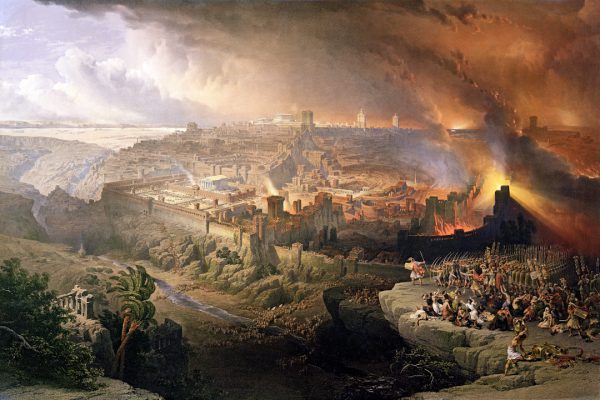
When it comes to the most full, direct, comprehensive, and majestic explanation of the gospel, there is no other book in all of Scripture quite like Romans. While we believe all Scripture is breathed out by God; that the Bible is perfect, clear, and totally sufficient for life and godliness; and that every single page reveals the glories of Christ and the good news of salvation by grace through faith; Romans has a peculiar beauty about it. Its doctrine is rich; its logic is unassailable; its scope is breathtaking; its vision is glorious. In Paul’s letter to the Romans, it pleased our God and Savior to grant his church a brilliantly concise yet profoundly exhaustive summary of his gospel.
The Entrance to the Treasures of Scripture
From Augustine and Chrysostom in the 4th century to Martin Luther in the 16th, from John Wesley to Karl Barth to John Piper, this book has had a tremendous influence on many of the great pastors and theologians of the Christian church, and is cherished by every saint. In his Preface to the Epistle to the Romans, Luther wrote: “[Romans] is worthy not only that every Christian should know it word for word, by heart, but occupy himself with it every day, as the daily bread of the soul. It can never be read or pondered too much, and the more it is dealt with the more precious it becomes, and the better it tastes.”1 Calvin’s words have also proved true for me: “When anyone gains a knowledge of this Epistle, he has an entrance opened to him to all the most hidden treasures of Scripture.”2 This book, like no other, has helped me better understand and savor the whole counsel of God.
And so, we are beginning new sermon series through the book of Romans. But before we dive into the exposition, I wanted to start with a general overview of the letter and its background.
Many tend to view Romans as simply a book on doctrine, like a theology textbook. But we must understand that Romans is first a letter, written to a specific church for a specific reason. So this morning, I’d like for us to consider the occasion of the letter (why it was written); the content of the letter (what it is about); and the relevance of the letter (why it matters today).
As we begin this journey, I want us to see that we need Romans because what the world and the church need most is to believe and obey the gospel of God. Romans is all about what God has done in Christ Jesus to reveal his righteousness, to accomplish our salvation, to give us hope, and to bring about the obedience of faith for the sake of his name among all the nations.
The Occassion of Romans
To understand why Romans was written, we must begin with who wrote it. This we learn in the first verse “Paul, a servant of Christ Jesus, called to be an apostle, set apart for the gospel of God” (Rom. 1:1). Romans was written by the Apostle Paul, the man formerly known as Saul of Tarsus. We meet Paul in the book of Acts, where we learn of his persecution of the church, his encounter with the risen Lord Jesus on the road to Damascus, and his gospel ministry to the ends of the earth. To introduce himself to the church at Rome, Paul describes himself with three important labels that together reveal his Master, his office, and his mission.3
- He is a slave of Christ Jesus—a humble and obedient servant of the risen Lord. While true of every believer, Paul goes on to show how he was uniquely called to serve his Master.
- He is a called apostle—one of those uniquely called and directly commissioned by the risen Lord Jesus. He was an eyewitness of his resurrection and sent out to witness in his power.
- And as a slave and a called apostle of Jesus, he had been set apart for the gospel of God. This was his mission, his purpose, in all of life. God had set him apart before had even been born!
Near the end of the letter, he elaborates on these titles in more detail: “I have written to you very boldly by way of reminder, because of the grace given me by God to be a minister of Christ Jesus to the Gentiles in the priestly service of the gospel of God” (Rom. 15:15-16). So, this is the Apostle Paul, the author. And in verses 8-15, he is quick to mention that he is eager to preach gospel in Rome; he longs to see this church. But why? Why this zeal to get to Rome?
This brings us to the next part of understanding why Paul wrote Romans: when he wrote the letter. He explains his situation and desire to visit Rome more fully at the end of his letter, in chapter 15. He first explains that “from Jerusalem and all the way around to Illyricum [northwest of Greece] he had fulfilled the ministry of the gospel of Christ” (Rom. 15:19). This is what we read about in Acts 13-20: Paul’s missionary work in the eastern part of the Roman empire. While he often stopped to encourage the churches he had planted along the way, his driving ambition was always “to preach the gospel” where Christ had not yet been proclaimed (Rom. 15:20). He then states his purpose clearly: “But now, since I no longer have any room for work in these regions, and since I have longed for many years to come to you, I hope to see you in passing as I go to Spain, and to be helped on my journey there by you, once I have enjoyed your company for a while. At present, however, I am going to Jerusalem bringing aid to the saints” (Rom. 15:23-25).
Paul saw himself at a ministry crossroads, so to speak. He had preached Christ and planted churches everywhere in the East. Now, he wanted to go to the ends of the earth: to Spain. This is what we see in Acts 19:21, when Paul resolved to go to Rome. After the riot at Ephesus, Luke writes in Acts 20 that Paul visited the churches in Macedonia and Greece one last time before heading Jerusalem, and he ended up staying at Corinth for 3 months during the winter of 57 AD. It was here that he penned the epistle to be sent to the church at Rome.
Now we’re ready to look at why Paul wrote this letter. While preaching the gospel everywhere east of Rome, he had been supported by the church at Antioch. But now, since he wanted to preach Christ west of Rome, in Spain, he needed a church that would support him for this ministry.
So, here’s why he wrote to the Romans: First, Paul wanted to introduce himself and his gospel. He needed to establish his credentials and his message to a church he had never met. You see, Paul didn’t plant the church at Rome (it was most likely started by Jews from Rome visiting Jerusalem when Jesus poured out his Spirit in Acts 2). This explains the length of the letter’s opening and closing; Paul planted the other churches he wrote to, so they knew him! This also explains why Romans is such a beautifully precise and sweeping presentation of the gospel. Paul’s message of freedom through faith in Christ for Jew and Gentile was often slandered by his opponents. So, Paul writes to clear up confusion and demonstrate how “his gospel” (as Christ’s apostle to the Gentiles) was none other than God’s gospel.
Second, Paul wanted to unify the churches around his gospel and encourage them in the faith. Though Paul had never visited the church at Rome, he had heard of their faith through mutual acquaintances and become aware of some serious problems in the church. The church at Rome was a predominantly Gentile church and—as you can imagine—many of the issues we saw in Acts, about Gentiles being a part of the new covenant people of God, had created some serious difficulties for Jewish believers and conflict between both groups. Therefore, Paul desired to strengthen this church by his gospel ministry and help correct attitudes between Jews and Gentiles that were inconsistent with the good news of Jesus.
Third, Paul wanted to bring his gospel to Spain and involve the Romans in his ministry. This was his ultimate purpose in writing to Rome. He didn’t just have a theological purpose (to clarify his gospel) or a pastoral purpose (to strengthen the church), but a missionary purpose. Paul wanted to bring about the obedience of faith for the sake of Christ’s name among all the nations, including Spain. He wanted all peoples to be glad in the gospel of God’s grace.
So, by writing this letter, Paul sought to introduce himself and his gospel to the church at Rome; to unify them around his gospel; and to secure them as a base for mission. This brings us now to…
The Content of Romans
To summarize Romans in just a few minutes is no small feat. But a summary of its content is helpful for understanding why we need to hear this letter today. We need to hear Paul’s gospel, which is none other than the gospel of God. R. C. Sproul puts it like this: “The message [Paul] is setting forth here is the announcement of good news from God himself. It is God’s gospel. God owns it, God originated it, God designed it, and now God is simply using the apostle Paul to communicate it to us.”4 This is the message we need to hear. Not primarily what the news tells us, but what God has told us. If the God who is infinitely good has a gospel, has good news, we ought to listen up!
Paul briefly explains in the next few verses what God’s gospel is: it is the good news promised beforehand in the OT concerning his Son, Jesus Christ, who is the Redeemer and the risen Lord. I want us to see how Paul flushes out this gospel throughout the course of the letter. Here’s a brief outline:
In 1:1-17 we find the opening of the letter and its central theme. What is the theme? “For I am not ashamed of the gospel, for it is the power of God for salvation to everyone who believes, to the Jew first and also to the Greek. For in it the righteousness of God is revealed from faith for faith, as it is written, “The righteous shall live by faith” (Rom. 1:16-17).
So, Paul begins in Romans 1:18-4:25 with the righteousness of God revealed in the gospel. He explains how God’s wrath is revealed against all humanity, against all who suppress the truth in unrighteousness. Whether religious or irreligious, Jew or Gentile, with or without the Law, all have sinned and fallen short of God’s glory—short of what we were made for. But the good news is that God’s righteousness is not only revealed in judgment but in an act of salvation, for God put forth his Son to be the atoning sacrifice for sin. In the death and resurrection of Christ, God is both just and the justifier of the one who has faith in Jesus.
This brings us, in chapters 5-8, to the hope of salvation provided by the gospel. Having explained justification by faith, Paul moves into all the benefits of being united to Christ. The theme here is the joyful hope and new life available for those who trust in Jesus. It reveals how God’s righteousness not only promises hope for tomorrow but strength for today, for “grace reigns through righteousness leading to eternal life through Jesus Christ” (Rom. 5:21). For those found in Christ, Paul explains we are freed from the power of sin to now be slaves of righteousness (chap. 6); that we have been released from the Law to bear fruit for God (chap. 7); and that we longer walk in the flesh but in the Spirit (chap. 8), secure in his love.
Then, in chapters 9-11, Paul transitions to the plan of God vindicated in the gospel. After the crescendo of chap. 8, that nothing can separate us from God’s love, Paul explores the problem of Israel’s unbelief, since it seems to call God’s faithfulness into question. If God’s righteousness is revealed in the gospel, and it is first for the Jew, then why are Gentiles responding in faith while the majority of Jews are rejecting Christ? “Is the God who made saving promises to Israel faithful to his word?”5 This is what Paul seeks to address. Remember, Paul is writing to a church comprised of predominantly Gentiles, and there’s conflict with them and the Jews. So, Paul here proves how God’s plan for Jew and Gentile alike also reveals his righteousness, his wisdom, and saving power, all for his glory alone.
Paul then, in 12:1-15:13, shows the transformation of life made possible by the gospel. After 11 chapters describing God’s righteousness revealed in the gospel, Paul calls the church to practice God’s righteousness in all of life as a result of their salvation by faith. Through a series of commands, Paul shows how the gospel transforms our relationship to God, one another, our enemies, the governing authorities, God’s Law, and weaker brothers.6 He then concludes the letter from 15:14-16:27 with his future plans and personal greetings.
So we’ve seen the occasion for the letter (why Paul wrote it) and the content of the letter (what it’s all about). But the final question is, why does this matter for us all today? Why do we need Romans?
The Relevance of Romans
First, Romans matters for our church’s gospel witness because our world needs to hear, to believe, and to obey the gospel of God. This is the unchanging message we must faithfully proclaim! The suppression of truth and sinfulness of all mankind described by Paul in chapters 1-3 is still the most true and accurate description of the world in which we live. In fact, to someone who has never read Romans, it would sound like something written just a couple of weeks ago! The truth of the matter is that “none is righteous; no not one” (Rom. 3:10-12); that “the whole world [is] accountable to God” and guilty under the Law (Rom. 3:19-20). No matter how religious you are, or how kind-hearted you, or how indifferent you are, the righteous wrath of God is stored up for you.
But the good news, for you and for me, for your neighbor and your enemy, is that God’s righteousness has been revealed in the resurrection of his Son from the dead. Whoever confesses with their mouth that Jesus is Lord and believes in the heart God raised him from the dead, will be saved! We can be “justified by his grace through the redemption that is in Christ Jesus, whom God put forward as a propitiation by his blood to be received by faith” (Rom. 3:24-25). This is the answer to the injustice, to the wickedness, to the hypocrisy, to the futility of our world. This gospel alone is the answer for the lost, the hurting, the hopeless, the weary, the wounded, the guilty. It is the gospel of God that is the power for salvation.
But second, Romans matters for our church’s gospel culture because our church needs to believe and obey the gospel of God! We must remember that the reason Paul wrote this letter was to strengthen the church in the faith and to see them walk in unity. The purpose of sound gospel doctrine is devotion. It’s not merely to increase our knowledge of God but to increase our godliness. Like the church at Rome, our relationships are not perfect; our conduct is not perfect; the same divisions and conflict of the church then are still used by Satan to destroy the church today. But by God’s grace, we can offer true worship to him through Christ. In him, we can experience the reign of grace that leads to righteousness. In him, we can rejoice in hope of the glory of God.
Let’s pray that God would use this letter to increase our obedience to God’s gospel, our hope in his promises, our joy in our trials, and our love for one another, all for the praise of his glory
Recommended Resources
- Romans resources by BibleProject
- Five free courses and lectures on Romans provided by The Gospel Coalition
- Romans 1-7 For You and Romans 8-16 For You, by Tim Keller
- “Look at the Book” Bible study videos on Romans by John Piper
Endnotes
- Martin Luther, “Preface to the Epistle to the Romans” (1522) in Douglas J. Moo, The Epistle to the Romans, The New International Commentary on the New Testament (Grand Rapids, MI: Wm. B. Eerdmans Publishing Co., 1996), 22.
- John Calvin and John Owen, Commentary on the Epistle of Paul the Apostle to the Romans (Bellingham, WA: Logos Bible Software, 2010), xxix.
- Moo, The Epistle to the Romans, 40.
- R. C. Sproul, The Gospel of God: An Exposition of Romans (Great Britain: Christian Focus Publications, 1994), 20.
- Thomas R. Schreiner, Romans, ed. Robert W. Yarbrough and Joshua W. Jipp, Second Edition., Baker Exegetical Commentary on the New Testament (Grand Rapids, MI: Baker Academic: A Division of Baker Publishing Group, 2018), 462.
- John R. W. Stott, The Message of Romans: God’s Good News for the World, The Bible Speaks Today (Leicester, England; Downers Grove, IL: InterVarsity Press, 2001), 41–42.

Matt Bedzyk serves as lead pastor at Emmanuel Community Church where he has faithfully served in many capacities for most of his life. He received his Master of Divinity from Midwestern Baptist Theological Seminary. Matt and his wife Brianna have three children: Lorien Grace, Owen James, and Vivian Jane. In his spare time, you can find him reading, brewing coffee, enjoying music, and supporting Manchester United and OG esports.




